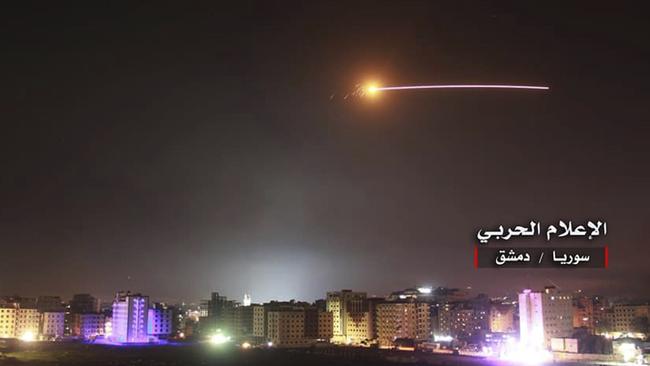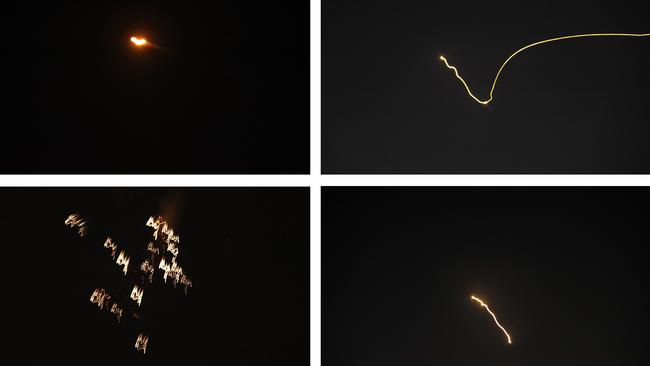Israel jets strike key Iranian targets inside Syria
Risk of wider Middle East war increases as Israeli warplanes launch blistering attack on key Iranian infrastructure in Syria.

Israel’s blistering counter-attack to Iranian rocket fire at its soldiers on Thursday shows the country is determined to dislodge Tehran’s forces in Syria from its border, despite the risk of a wider Middle East war.
In what the Israeli military called its largest-ever operation inside Syria, warplanes made dozens of strikes against key Iranian infrastructure, an overwhelming response after an Iranian unit in Syria fired about 20 short-range artillery rockets that Israel said were either shot down or fell short of a nearby military base.
The US and Israel are increasingly concerned about Iran’s exploitation of the instability of Syria’s seven-year war to spread its influence, with officials saying they see its activities there as part of Iran’s efforts to project power in the wider region.
Israel’s military wants to prevent Tehran from building up military capabilities in Syria comparable to those in neighbouring Lebanon, where it has nurtured the Shiite militia Hezbollah and helped it confront Israel militarily, according to Amos Yadlin, a former head of Israeli military intelligence.
“They will not let them duplicate Hezbollah,” he said. “They will not let them have an advanced military capability in Syria.”
Some analysts and officials see President Donald Trump’s decision to withdraw from the multilateral nuclear accord on Tuesday a potential trigger for more violence, as Iran seeks to punish the US and its regional allies through the proxies it controls.
The small scale of the attacks against Israel suggests Tehran isn’t at this point inclined to provoke a bigger war. Iran, for example, didn’t use its most advanced missiles, according to Michael Horowitz, an analyst at Le Beck International, a security and risk management firm.
By contrast, said Mr. Horowitz, Israel’s escalation was designed to convey to Tehran, and its ally Russia, “about the need to rein in Iran or face the threat of a broader conflict.”
Iran’s forces there support President Bashar al-Assad, who with the help of Iran and Russia is trying to fend off a challenge from US-backed rebels and Islamic State militants. Iranian-backed Shiite militias, like the US, are also opposed to Islamic State.
Israeli warplanes hit Iranian logistics compounds, munition storage warehouses, intelligence sites and observation posts, according to the Israeli military. Many of the sites belonged to the Quds Force, an elite branch of Iran’s Islamic Revolutionary Guard Corps.
Israel’s Defense Minister Avigdor Lieberman said the Israeli strikes hit nearly all Iranian infrastructure in Syria. “[The Iranians] have to remember,” he told a policy conference, “if for us it’s raining, it will be a flood for them.”
Iranian officials have yet to respond, but the Islamic Republic has used small-scale attacks before to needle Israel, which alongside the US is considered a bitter enemy. In February, Israel said an armed Iranian drone strayed across its northern border before Israeli forces shot it down in an incident that ended with the downing of an Israeli jet.
Without referring specifically to the Israeli attacks, Brig. Gen. Hossein Salami, the deputy commander of the IRGC, boasted Thursday that Iran had become deeply influential in Syria.
“We will expand our deterrent and defensive power, and will not disarm ourselves against our enemies,” said Mr. Salami, according to the official Islamic Republic News Agency.

Iran is expected to punch back, said Reza Marashi, the research director at the National Iranian American Council, but officials will first have to assess the damage and formulate a strategy. Iran would likely also consult with Russia before making any moves, he said, so as to avoid losing a crucial leg of support.
“My concern is I don’t see what the off-ramps are,” he said. “I liken it to a car driving down the freeway and there’s a cliff at the end that goes into the ocean, and there’s no exit. If we don’t build off-ramps quickly, we’re going to fall off a cliff.”
Syrian state media reported its forces shot down dozens of Israeli missiles. The Israeli military said it faced Syrian aerial defence fire and in response targeted several aerial interception systems that belong to the Syrian military.
The Syrian regime has sought to project strength, even as its military forces have been drained and it has relied on Iran and Russia. Pro-regime media Al-Masdar News reported that while the Syrian military did “the bulk of the work, the Iranian forces … are believed to be participating in these retaliatory strikes against Israel.”
Intelligence officials have estimated that Iran works from five airfields in Syria. At each, Iranian military transport aircraft bring weapons for Hezbollah or missiles and drones specifically for Iranian forces, these officials said. The intelligence officials also said there is a Quds Force command centre at the Aleppo Airport.
“Iran’s presence and activities in Syria have nothing to do with protecting the sovereignty and territorial integrity of Syria,” Brett McGurk, the U.S. envoy to the fight against Islamic State, told a conference in Israel on Thursday. “Iran’s presence risks a wider conflict that would mire Syria in ongoing turmoil for months and years to come.”
Some allies have urged against any escalation of hostilities. On Thursday, French President Emmanuel Macron discussed the air strikes with German Chancellor Angela Merkel, an aide to Mr. Macron said, adding that both leaders expressed worry and called for a de-escalation in tensions.
Russian news agencies quoted Deputy Foreign Minister Mikhail Bogdanov as saying there should be efforts to de-escalate. “We have developed contacts with all sides and we are indeed calling for restraint,” agencies quoted Mr. Bogdanov as saying.
Russia wants to avoid a broader confrontation that would upset the careful balance of interests Russia has relied on to become one of the most important actors in the conflict.
Mr. Bogdanov added that the strikes were brought up during the visit of Prime Minister Benjamin Netanyahu in Moscow this week for Russia’s commemoration of the Soviet Union’s triumph over Germany in World War II. Israel informed Russia prior to carrying out the strikes, the Israeli military said.
The Wall St Journal



